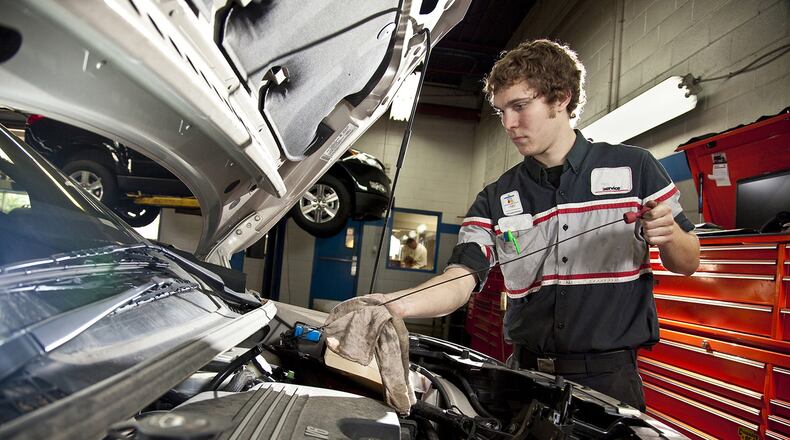My usual oil-change place has recommended synthetic oil for quite a while, and I assumed that was best for an older vehicle, even though it’s more expensive. However, I recently tried out the Ford dealer’s “Quick Lane” oil-change option and asked for synthetic oil. They told me that they use a blend of synthetic and regular oil, and the bill was surprisingly low.
This made me worry that in exchange for a lower price, I was shortchanging my vehicle by using mostly regular oil (since I didn’t ask how much synthetic is in the “blend”). When I asked about it, I was basically given the “don’t worry about it, little lady” response.
That’s when I decided to write to Car Talk, who never talks down to us “little ladies”! Should I stick with the synthetic oil or save a few bucks? -- Cowgirl Sue
RAY: Stick with the full synthetic oil, Sue. Synthetic oils outperform traditional oils in pretty much every performance category -- including the all-important areas of viscosity and fluidity at colder temperatures.
And while they cost more, they not only perform better and offer better protection to your engine, they also last longer, so you change your oil less often. So if you’re interested in such things, you’ll also be disposing of less waste oil, which is better for the environment.
If you had asked the Quick Lane guy to tell you how much synthetic oil is in the blend they use, he’d probably have no idea. “Don’t worry about it, little lady” is your clue that he doesn’t know.
Oils are not required to list their ingredients on the side of the container like salad dressings. So you’re right to suspect that a low price probably means less of the good stuff.
So unless the Quick Lane offers a genuine, full synthetic oil as an extra cost option, I’d go back to your old guy and keep using the synthetic. That’ll give you the best chance of keeping your Expedition running well into old age -- its old age and yours.
Toyota’s rusty frame may be more than meets the eye
Dear Car Talk:
I have a car problem. A serious car problem. I’m 36 and bought my 26th “new to me” car. I guess I like change.
I just picked up this pristine, one-owner 2014 Toyota FJ Cruiser with 25,000 miles that lived outside in Newport News, Virginia. The body is fantastic, and the underside is pretty good. But there is some surface rust on the frame. How can I properly remove and repair it?
I drove it back to Colorado, where my wifey says it’s my last car ever, and I feel the same way. I thought about using a wire brush and some Rust-Oleum type product and calling it a day. They don’t use salt on the roads here in Colorado, so I won’t be aggravating it. Thank you in advance. -- David
RAY: Unless you have a family history of having grand pianos fall on you by age 45, I doubt this is going to be your last car ever, David. And if you don’t take care of this rust on the frame, it might not even be your last car of this decade.
Unfortunately, Toyota has had problems with rusty frames on some of their trucks. Most famously, they agreed to repair or replace the rusted frames of earlier Tacoma pickup trucks. And there’s a class action lawsuit to get them to do the same by owners of some Toyota 4Runners.
Like those vehicles, the FJ is a Toyota body-on-frame design. And we’ve seen a number of complaints about frames rusting prematurely on FJ Cruisers, too.
Driving in Colorado, where salt is used very sparingly, will help. But the vehicle did spend its formative years on the East Coast, where the roads are practically sponsored by Morton. In addition, if the underside was scraped up from off-road driving, that could allow rust to take hold, too.
So you need to get this frame professionally evaluated. I’d do some research and look for an autobody shop in your area that really seems to understand rust repair and rust prevention. Have them look over the frame and figure out how “surface” your rust really is.
If it’s just surface rust, it can be cleaned off and the frame can then be repainted and treated with a rust preventative. You’ll still have to keep an eye on it over the years and be careful to keep any serious rust from taking hold on the frame.
But if the rust is already more than skin deep, then I would recommend “reverting to form,” David. That is, embracing your love of change. Drive the FJ until you’re sick of it and you realize you hate not being able to see out the sides or the back of this thing. And then sell it and let the next owner fix the rust.
Based on your history, I predict you’ll be sick of it in about nine months. By then, I predict you’ll be breathing heavily over a new Ford Bronco anyway. You’ll have some ‘splainin to do to your wife, David. But honestly, there’s no way she can claim to be surprised.
Got a question about cars? Write to Ray in care of King Features, 628 Virginia Drive, Orlando, FL 32803, or email by visiting the Car Talk website at www.cartalk.com.
About the Author

